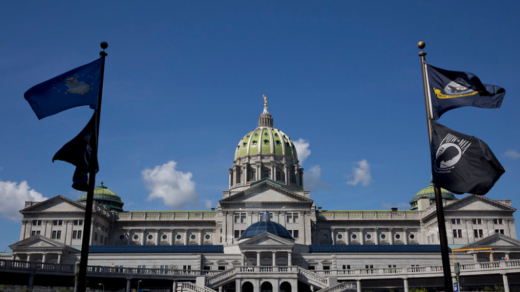By Kim Lyons | Pennsylvania Capital-Star
A group of Pennsylvania Democratic lawmakers on Monday announced they plan to introduce legislation to undo the requirement that abortion clinics in the state meet the same regulations as ambulatory surgical centers, which reproductive rights advocates say do little more than restrict patients’ access to care.
Rep. Tarik Khan (D-Philadelphia), who is a nurse practitioner, said the law signed by then-Gov. Tom Corbett in 2011 required abortion clinics to “obtain and maintain burdensome and unnecessary expensive structural modifications.” The law mandates specialized elevators, flooring and HVAC units, and places restrictions on the size of how big hallways and procedure rooms must be.
“These unfortunately caused many abortion facilities to close and limits, even to this day, access to safe abortion care,” Khan said at a press conference in Harrisburg. The legislation would also do away with the requirement that abortion providers in Pennsylvania maintain admitting privileges or have transfer agreements at hospitals.
The restrictions Khan described are known as TRAP laws – targeted regulation of abortion providers. When Pennsylvania enacted its law in 2011, both chambers of the legislature were controlled by Republicans.
At the time lawmakers argued that the regulations would make clinics safer for women, spurred partly by a gruesome grand jury report about Kermit Gosnell’s illegal abortion clinic in Philadelphia. Gosnell was convicted in 2013 of three counts of first-degree murder for the deaths of infants at the clinic, as well as other related crimes. His facility had not been inspected for more than a decade, officials said at the time.
But such TRAP laws have been denounced by medical organizations like the American Medical Association, the American College of Obstetricians and Gynecologists, the American Academy of Pediatrics and others.
The medical groups wrote an amicus brief to the U.S. Supreme Court in 2019 to protest a Louisiana law that required abortion providers in that state to have hospital admitting privileges: “Laws regulating abortion should be evidence-based and supported by a valid medical justification,” they wrote in the brief. “Because laws requiring clinicians who provide abortions to have local admitting privileges are neither, this Court should not allow them to stand, regardless of the state from which they originate.”
The Supreme Court overturned the Louisiana law in 2021, with Chief Justice John Roberts voting with the liberal justices.
State Rep. Danielle Friel Otten (D-Chester), who is co-sponsor on legislation to have abortion enshrined in the Pennsylvania Constitution, said Monday that the restrictive TRAP laws don’t result in fewer abortions.
“They mean more unsafe procedures,” she said. “They mean more women putting their lives at risk —or the government putting women’s lives at risk. They mean headlines like we’ve seen in Ohio and Texas, where women are dying of sepsis because they’re waiting for the government to allow them to receive the essential care that they need they desire and that their doctors recommend. Excessive restrictions on women’s health care means less women’s health care. It doesn’t mean less abortions. It means less safe health care for women and girls in this Commonwealth.”
State Rep. Mary Issacson (D-Philadelphia) said Monday she remembers when the original bill putting the restrictions in place was passed.
“Quite frankly, it was just another repeated attempt to make abortion inaccessible more and more,” she said. “There is no reason to have to have the standards put forth in that bill for a clinic for women’s reproductive health. As someone mentioned to me earlier, we don’t require such restrictions when a man wants to get a vasectomy. So it’s about time that we roll back these restrictions.”
Rep. Gina H. Curry (D-Delaware), noted there are only 17 abortion clinics left in Pennsylvania, due in part to the restrictions on facilities. “Where are women who can’t get access supposed to go?” she said. “The impact beyond abortion is a whole other story, ultimately impacting the tragic outcomes for maternal mortality and maternal morbidity.”
Abortion is legal up to 24 weeks in Pennsylvania, and there is a 24-hour waiting period before a patient can receive an abortion.









